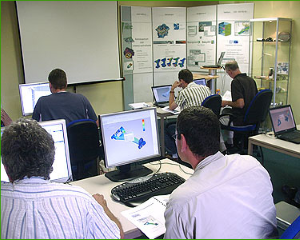Courses/Training FEM/FEA
HEC offers various Finite Element Method (FEM) courses. If you are interested in one of our courses, please feel free to contact us. Personal suggestions are welcome.
Phone +31 (0)30 600 60 60 or
e-mail us info@hecbv.nl
FEM in practice
Many companies with an engineering department have their own FEM software, often bought in combination with CAD software. Learning how to use this software is often limited to knowing which buttons to push. Our courses aim to interpret the results correctly and successfully integrate the FEM software in the engineering department.
Basic training FEM in practice
In this course you learn the basics of FEM. This 1 day training contains:

- Introduction
- Theoretical background FEM
- Meshing and refining mesh
- Boundary conditions and loads
- Interpreting the results
Advanced/Custom training FEM in practice
Are you already experienced using FEM software and would you like to extend your knowledge? Topics we can teach you about are e.g.:
- Non linear:
- Contact
- Large deformations
- Plasticity
- Fatigue
- Interpreting results based on design codes
- Dynamics:
- Modal analysis (natural frequencies)
- Response in time or frequency domain
- Earthquake / shock analysis
- Random vibration response (PSD)
Personal suggestions are welcome.
Creo Simulate (Mechanica) Base course
This 2 day course contains:
Day 1:
- Introduction / starting exercise
- Presentations Models and Elements
- Exercise: Solids and contact
- Lunch
- Presentations: Loads and boundary conditions
- Tips
- Extra exercises
Day 2:
About two weeks later the second day is organized. This way you’ve had the opportunity to practice and have the possibility to solve possible problems. Also this second day you may bring your own projects to start up.
Creo Simulate (Mechanica) Advanced / Custom Training
Are you experienced in de basics of Creo Simulate and would you like to extend your knowledge?
Topics we can teach in the Advanced Training Creo Simulate are:
- Non linear:
- Contact
- Large deformations
- Plasticity
- Fatigue
- Interpreting results based on design codes
- Dynamics:
- Modal analysis (natural frequencies)
- Response in time or frequency domain
- Earthquake / shock analysis
- Random vibration response (PSD)
Personal suggestions are welcome.

